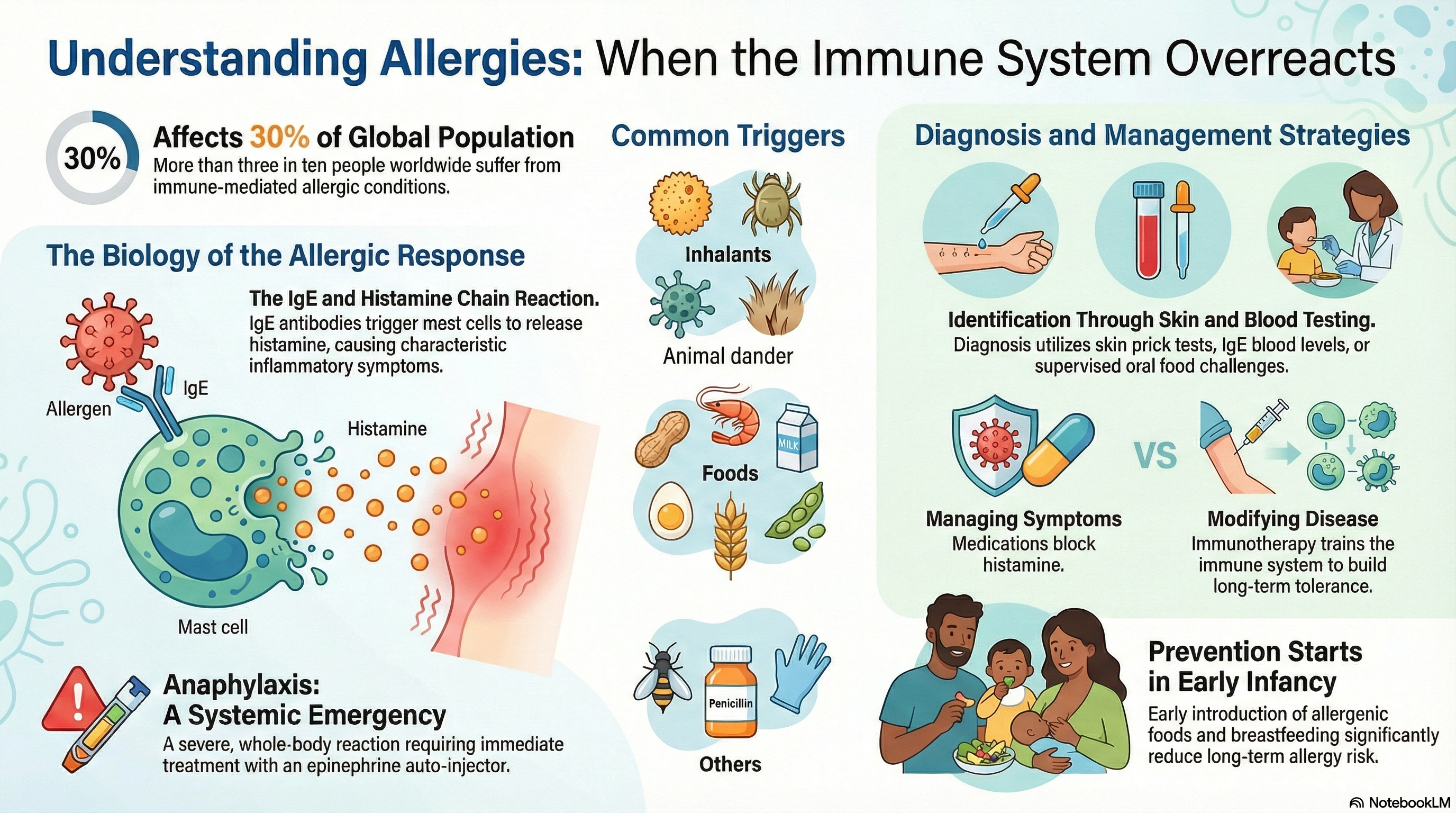What is Allergies?
An allergy is an immune-mediated inflammatory response to common environmental substances that are otherwise harmless. While the immune system is designed to protect the body against dangerous invaders like parasites and bacteria, in an allergic individual, it mistakenly identifies a harmless substance—called an allergen—as a threat.
This condition affects more than 30% of the global population and involves the production of specific IgE antibodies. When an allergic person is exposed to their specific trigger, these antibodies prompt immune cells (mast cells and basophils) to release inflammatory chemicals, such as histamine. This release results in the characteristic symptoms we recognize as an allergic reaction, ranging from mild itching to life-threatening emergencies.

Causes of Allergies
Allergies result from a combination of genetic predisposition and environmental exposure. The process typically begins in early childhood through a phase called "sensitization," where the immune system first develops antibodies against a substance.
Common Allergens Inhalants: Pollen (trees, grasses, weeds), dust mites, mold, and animal dander. Foods: Peanuts, tree nuts, shellfish, fish, milk, eggs, wheat, and soy. Medications: Penicillin and related antibiotics, as well as nonsteroidal anti-inflammatory drugs (NSAIDs). Others: Insect stings (bees, wasps), latex, and contact irritants like nickel or fragrances.
Why Allergies are Increasing Researchers have proposed several theories for the rapid rise in allergic diseases, including the "hygiene hypothesis," which suggests that overly clean environments prevent the immune system from learning to distinguish between friend and foe. Other factors include climate change leading to longer pollen seasons, air pollution, and changes in our internal microbiome.
Symptoms of Allergies
Allergic diseases can manifest in various organs throughout the body. The symptoms you experience depend on how you encountered the allergen and which part of your body is reacting.
Respiratory Symptoms Allergic rhinitis (hay fever) causes sneezing, a runny or stuffy nose, and itchy eyes or throat. In cases of allergic asthma, individuals may experience wheezing, shortness of breath, and chest tightness.
Skin Symptoms Atopic dermatitis (eczema) results in itchy, red, and dry skin. Contact dermatitis causes a localized rash after touching an allergen, while urticaria (hives) appears as raised, itchy welts on the skin.
Digestive and Systemic Symptoms Food allergies can cause stomach pain, vomiting, or swelling of the lips and tongue. The most severe symptom is anaphylaxis, a life-threatening, whole-body reaction that causes a sudden drop in blood pressure, difficulty breathing, and loss of consciousness. This requires immediate emergency treatment with epinephrine.
Diagnosis of Allergies
A proper diagnosis is essential to distinguish true allergies from other sensitivities. It begins with a detailed medical history and an evaluation of your symptom patterns.
Testing Methods Skin Prick Testing: A tiny amount of allergen is placed on the skin, which is then lightly pricked. A small raised bump (like a mosquito bite) indicates a positive reaction. Serum IgE Testing: A blood test that measures the levels of allergen-specific IgE antibodies in your system. Patch Testing: Used specifically for contact dermatitis to identify reactions to chemicals or metals over a 48-to-72-hour period. Oral Food Challenge: Considered the "gold standard" for food allergies, this involves eating small, increasing amounts of a suspected food under strict medical supervision.
Treatment of Allergies
While most allergies cannot be "cured," they can be highly managed through a combination of strategies tailored to the individual.
Avoidance and Medication The first line of defense is avoiding known triggers. When exposure is unavoidable, pharmacotherapy is used to manage symptoms. This includes antihistamines to block the effects of histamine, intranasal corticosteroids to reduce airway inflammation, and epinephrine auto-injectors (EpiPens) for emergency treatment of severe reactions.
Immunotherapy Allergen-specific immunotherapy (allergy shots or sublingual tablets) is the only treatment that modifies the underlying disease. By exposing the body to tiny, increasing amounts of an allergen, it trains the immune system to become tolerant. This is highly effective for allergic rhinitis, asthma, and stinging insect allergies.
Biologics For severe cases of asthma or eczema that do not respond to traditional treatments, newer "biologic" medications (monoclonal antibodies) target specific parts of the immune pathway to stop the inflammatory response at its source.
Prevention of Allergies
Prevention efforts are most effective when started early in life, focusing on guiding the immune system toward tolerance rather than sensitivity.
Primary Prevention in Children Current medical evidence suggests that breastfeeding and avoiding exposure to tobacco smoke are two of the most effective ways to reduce allergy risk in children. Additionally, the early introduction of allergenic foods (like peanuts) in infants—rather than delaying them—is now recommended to help the immune system learn to accept these proteins.
Managing the "Atopic March" For individuals already diagnosed with one allergic condition, such as eczema, aggressive management can sometimes prevent the "atopic march"—the progression from skin allergies to food allergies, and eventually to respiratory issues like hay fever and asthma. Maintaining a healthy microbiome through a diverse diet and minimizing unnecessary antibiotic use may also play a role in long-term prevention.





